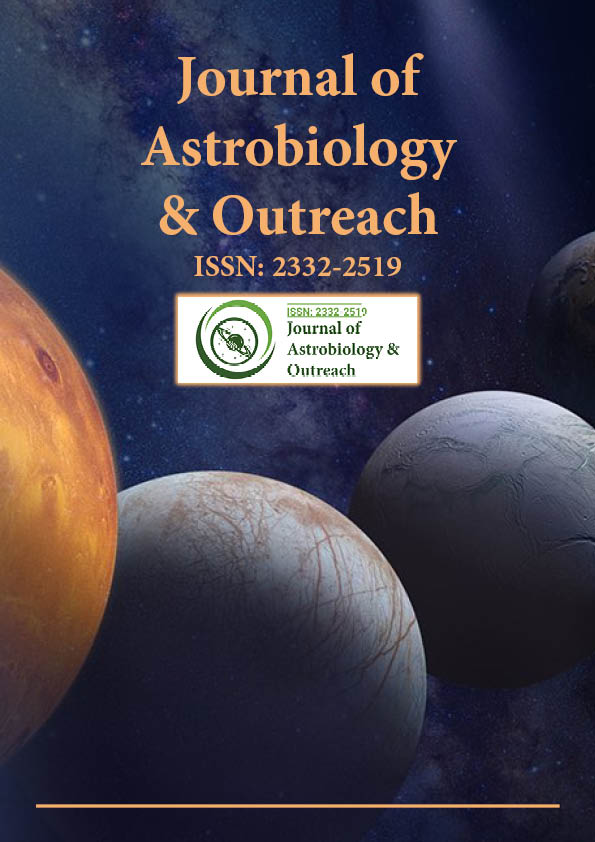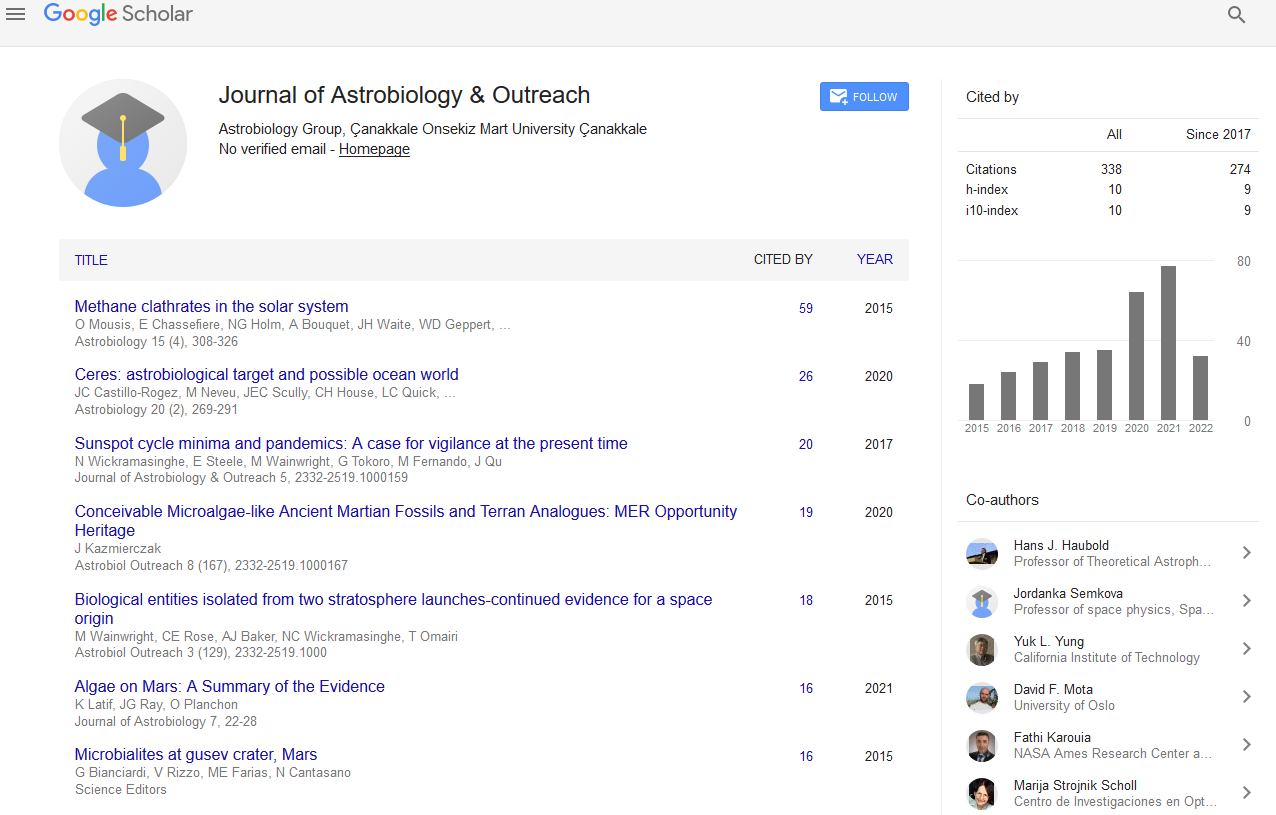Indexed In
- Open J Gate
- Academic Keys
- JournalTOCs
- RefSeek
- Hamdard University
- EBSCO A-Z
- OCLC- WorldCat
- Google Scholar
Useful Links
Share This Page
Journal Flyer

Open Access Journals
- Agri and Aquaculture
- Biochemistry
- Bioinformatics & Systems Biology
- Business & Management
- Chemistry
- Clinical Sciences
- Engineering
- Food & Nutrition
- General Science
- Genetics & Molecular Biology
- Immunology & Microbiology
- Medical Sciences
- Neuroscience & Psychology
- Nursing & Health Care
- Pharmaceutical Sciences
Short Communication - (2023) Volume 11, Issue 6
Exploring the Legal and Ethical Implications of Planetary Preservation Acts
Fabrice Hallak*Received: 14-Nov-2023, Manuscript No. JAO-23-24817; Editor assigned: 17-Nov-2023, Pre QC No. JAO-23-24817 (PQ); Reviewed: 01-Aug-2023, QC No. JAO-23-24817; Revised: 08-Dec-2023, Manuscript No. JAO-23-24817 (R); Published: 15-Dec-2023, DOI: 10.35248/2332-2519.23.11.328
Description
In recent years, the rapid advancement of space exploration and the increasing interest in the search for extra-terrestrial life have prompted discussions about the need for legal and ethical frameworks to assist the human activities beyond earth [1]. The concept of planetary preservation acts has emerged as a potential solution to address these concerns. This essay delves into the legal and ethical implications of such acts, exploring the complexities involved in preserving celestial bodies and responsible for further exploration [2].
As humans venture into space and potentially interact with celestial bodies, the absence of comprehensive legal frameworks poses a significant challenge. Planetary preservation acts would aim to replace by establishing guidelines and regulations to govern human activities in space. Key considerations include the prevention of contamination, protection of potential extraterrestrial life forms, and preservation of celestial environments. One potential legal challenge involves defining the scope and jurisdiction of such acts [3]. International cooperation is potential in addressing activities that transcend national borders. The outer space treaty, signed by various nations, serves as a foundational document governing space exploration. However, it lacks specific provisions related to planetary preservation. Crafting an international agreement that builds upon existing treaties while addressing the unique challenges of planetary preservation is essential [4].
Beyond legal concerns, ethical considerations play a pivotal role in discussions surrounding planetary preservation. As humanity extends its reach into the cosmos, questions arise about our responsibility to protect potential ecosystems on other celestial bodies. Ethical frameworks must be established to guide space exploration activities, balancing the pursuit of scientific knowledge with a commitment to preserving the integrity of extra-terrestrial environments. One ethical consideration revolves around the potential existence of extra-terrestrial life [5]. If life is discovered beyond Earth, whether in microbial or more complex forms, ethical guidelines would need to dictate how humans interact with these life forms. Respect for the autonomy and well-being of extra-terrestrial life, if it exists, becomes a most important consideration. This raises questions about the potential impact of human activities, such as sample collection and analysis, on these alien ecosystems [6].
The tension between scientific exploration and planetary preservation is evident. Scientists are eager to study celestial bodies for clues about the origins of the universe and the possibility of life beyond earth. However, this enthusiasm must be tempered by a commitment to responsible exploration that minimizes the risk of contamination and environmental disruption. One ethical approach involves adopting a precautionary principle in planetary exploration [7]. This principle suggests that, in the absence of scientific consensus, actions that may have significant negative consequences should be avoided. Applying this principle to planetary preservation acts would require careful consideration of the potential impact of human activities on extra-terrestrial environments, prioritizing caution over unchecked exploration.
The role of technological innovation
Advancements in space exploration technology also contribute to the ethical discourse surrounding planetary preservation. The development of sophisticated robotics and artificial intelligence enables scientists to explore celestial bodies without direct human presence. This reduces the risk of contamination and minimizes the impact on extra-terrestrial environments. Embracing and advancing such technologies aligns with the ethical imperative of responsible exploration [8].
International collaboration and governance
Addressing the legal and ethical implications of planetary preservation acts necessitates robust international collaboration. Establishing a global governance framework for space exploration, with clear guidelines on planetary preservation, requires the cooperation of spacefaring nations [9].
As humanity's exploration of space advances, the need for legal and ethical frameworks to govern our activities beyond earth becomes increasingly pressing. Planetary preservation acts offer a potential solution to address these concerns, providing guidelines for responsible exploration, contamination prevention, and the protection of extra-terrestrial environments. Balancing the pursuit of scientific knowledge with ethical considerations and resulting international collaboration will be key in establishing a sustainable and respectful approach to planetary exploration. The ongoing dialogue on these issues will shape the future of human activities beyond our home planet and influence the legacy we leave in the cosmos [10].
References
- Poppe AR, Halekas JS, Lue C, Fatemi S. ARTEMIS observations of the solar wind proton scattering function from lunar crustal magnetic anomalies. J Geophys Res Planets. 2017;122(4):771-783.
[Crossref] [Google Scholar] [PubMed]
- Sasaki S, Nakamura K, Hamabe Y, Kurahashi E, Hiroi T. Production of iron nanoparticles by laser irradiation in a simulation of lunar-like space weathering. Nature. 2001;410(6828):555-7.
[Crossref] [Google Scholar] [PubMed]
- Foing BH, Stoker C, Ehrenfreund P. Astrobiology field research in Moon/Mars analogue environments. Int J Astrobiology. 2011;10(3):137-139.
- Stevens AH, Kobs Nawotniak SE, Garry WB, Payler SJ, Brady AL, Miller MJ, et al. Tactical scientific decision-making during crewed astrobiology Mars missions. Astrobiology. 2019;19(3):369-386.
[Crossref] [Google Scholar] [PubMed]
- David TJ, Hillenbrand LA, Petigura EA, Carpenter JM. A Neptune-sized transiting planet closely orbiting a 5-10-million-year-old star. Nature. 2016; 534(7609): 658-661.
[Crossref] [Google Scholar] [PubMed]
- De Wit J, Wakeford HR, Gillon M. A combined transmission spectrum of the Earth-sized exoplanets TRAPPIST-1 b and c. Nature. 2016; 537(7618): 69-72.
[Crossref] [Google Scholar] [PubMed]
- Demory BO, Gillon M, De Wit J. A map of the large day-night temperature gradient of a super-Earth exoplanet. Nature. 2016; 532(7598): 207-209.
[Crossref] [Google Scholar] [PubMed]
- Gillon M, Triaud AH. Seven temperate terrestrial planets around the nearby ultracool dwarf star TRAPPIST-1. Nature. 2017; 542: 456-460.
[Crossref] [Google Scholar] [PubMed]
- McCracken KG, Beer J, Steinhilber F. Evidence for planetary forcing of the cosmic ray intensity and solar activity throughout the past 9400 years. Coronal Magnetometry. 2014:585-607.
- Charvátová I, Hejda P. Responses of the basic cycles of 178.7 and 2402 in solar terrestrial phenomena during the Holocene. Pattern Recognit Phys. 2014; 2(1):21-26.
Citation: Hallak F (2023) Exploring the Legal and Ethical Implications of Planetary Preservation Acts. J Astrobiol Outreach. 11:328.
Copyright: © 2023 Hallak F. This is an open access article distributed under the terms of the Creative Commons Attribution License, which permits unrestricted use, distribution, and reproduction in any medium, provided the original author and source are credited.

